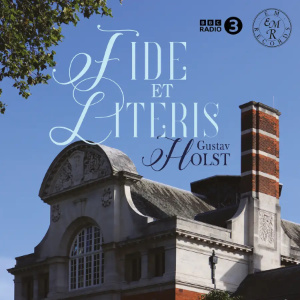
Fide et Litiris
Gustav Holst (1874-1934)
Contents listed after review
Em Marshall-Luck (reciter)
Paulina Voices (Heidi Pegler)
BBC Concert Orchestra/Leigh O’Hara
rec. 2023, The Great Hall, St. Paul’s Girls’ School, London
EM Records EMR CD090 [69]
This CD begins with a lively and stylish performance of the celebrated and much-recorded St Paul’s Suite by Gustav Holst. ‘Do we really need another recording of this?’ I hear you cry. Well, no; we don’t – but that’s not the real business of this lovely issue. That begins on track 8 (after the charming Brook Green Suite, also very nicely done) with a little Gavotte from 1933, never recorded before.
The CD is more evidence of the dedication to English music of Em Marshall, the driving force behind EM Records. She has harnessed her love and enthusiasm to great effect in recordings such as this, in addition to her work as Founder-Director of the English Music Festival. As well as supporting the music of English composers generally, she has encouraged research and rediscovery; hence this collection of little-known music by one of our greatest composers.
In addition to his work as a composer, Holst was an inspired and inspiring teacher. That can’t be said of that many great composers. Granted Fauré, Kodály and Messiaen are three that readily come to mind, and many others, such as Vaughan Williams, Britten and Prokofiev, have placed high value on more broadly defined educational music. But for Holst, it was a lifelong commitment, and there is no doubt that he loved deeply his work at St. Paul’s Girls’ School. As I learned from this issue’s comprehensive booklet notes, the school was opened in 1904 – much later than I had thought. The 31-year-old Holst joined the staff the next year, appointed by the redoubtable headmistress, Frances Ralph Gray, herself a most important figure in women’s education in the early 20th century.
Thus all the music on this disc was expressly written for the pupils of the school to perform, thereby illustrating the richness of talent that was available there, as well as the appetite for hard work and self-improvement. The most pleasing thing is that this recording has been made in the school itself, in its Great Hall, which would certainly have delighted Holst himself.
After the two suites, St. Paul’s and Brook Green (the latter named after the plot of land on which the school is situated), we have, first, the tiny but delightful Gavotte. It was apparently going to be a fourth movement of Brook Green, though Holst finally decided to omit it – I suspect because of time constraints.
Then comes the first of the two more substantial choral and instrumental works, Seven Choruses from the Alcestis of Euripides. New English translations of the plays of Aristophanes and Euripides had recently been published by Gilbert Murray, and in 1920 it was decided to mount a performance of Euripides’ Alcestis at the school, with some of the words set as choruses. The instrumentation is very simple – just harp and woodwind – and the choruses themselves have a rather austere quality, set as they are for unison voices. But Holst, as ever, has a way of contrasting the basic simplicity with sudden touches of striking beauty. The choruses here are interspersed with recitations from the play, which happily are provided by Em Marshall herself, and carried off with much aplomb.
The little Playground Song of 1911 was the result of a poetry competition run in the school, the winner of which was set to music by ‘Mr. von Holst’ as he was then known. He wasn’t the only person in England of German descent to drop a ‘von’ when World War 1 broke out.
Then follows what I suppose we can call the main feature of this disc, The Vision of Dame Christian of 1909, for female choir and orchestra. The occasion of its premiere was, perhaps a little ironically, the four hundredth anniversary of St Paul’s School, i.e. the boys’ school. Resources from the school’s founder, the 15th century priest and scholar Dean John Colet, had been made available to build the new school for girls. So the piece celebrates a shared history, and does so very movingly. As in the other vocal pieces here, the choir is the Paulina Voices, an auditioned chamber choir from the school, directed by Heidi Pegler. They sing beautifully, and with a great sense of understanding. This music, in separate parts for sopranos and altos, is also more grateful to sing than the previously mentioned rather austere unison lines of the Alcestis choruses. This is genuinely beautiful music – Holst at his best, fully aware of the needs and limitations of young, inexperienced musicians, yet writing for them without a shred of condescension.
This is a wonderful project, full of music well worth hearing, and the product of immense care and dedicated expertise by all concerned. My thanks and congratulations to them all.
Gwyn Parry-Jones
Previous review: Ken Talbot (December 2024)
Buying this recording via a link below generates revenue for MWI, which helps the site remain free


Contents
St. Paul’s Suite (1912)
Brook Green Suite (1933)
Gavotte (1933) *
Seven Choruses from the Alcestis of Euripides (1920) *
Playground Song (1911) *
The Vision of Dame Christian (1909) **
* World premiere recording
** First professional recording

















